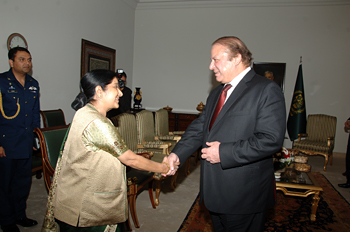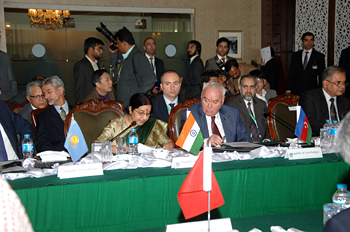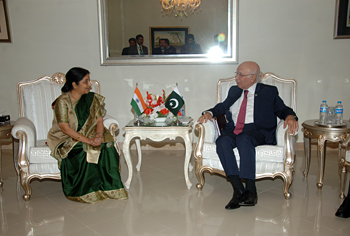INDIAN ARMED FORCES CHIEFS ON
OUR RELENTLESS AND FOCUSED PUBLISHING EFFORTS

SP Guide Publications puts forth a well compiled articulation of issues, pursuits and accomplishments of the Indian Army, over the years

I am confident that SP Guide Publications would continue to inform, inspire and influence.

My compliments to SP Guide Publications for informative and credible reportage on contemporary aerospace issues over the past six decades.
- Interim Defence Budget 2024-25 — An Analysis
- Union Defence budget 2024
- Indian Army: In quest of greater firepower and policy recommendations for gaps
- Indian Army Annual Press Conference 2024
- 6G will transform military-industrial applications
- Tata Boeing Aerospace Delivers 250 AH-64 Apache Fuselages, Manufactured in India
Heart of Asia — will Pakistan withdraw the knife?
div class="post_commentbox"> By Lt. General P.C. Katoch (Retd) Photo(s): By MEA |
By Lt. General P.C. Katoch Former Director General of Information Systems, Indian Army |

Sushma Swaraj, External Affairs Minister calls on Prime Minister Nawaz Sharif of Pakistan on the sidelines of the Fifth Ministerial Conference of the Heart of Asia Istanbul Process in Islamabad (December 09, 2015)

Sushma Swaraj External Affairs Minister addresses the Heart of Asia Conference in Islamabad, Pakistan (December 09, 2015)

Sushma Swaraj, External Affairs Minister meeting with Pakistan's National Security Advisor Mr. Sartaj Aziz in Islamabad (December 09, 2015)
The 'Heart of Asia' conference in Islamabad was the fifth in the series of ministerial level meetings that have been ongoing since 2011, in continuation of the 'Istanbul Process'. The Istanbul Process is the latest of numerous international initiatives of the last few decades to restore peace and development in and around Afghanistan. At the 4th December 2014 London Conference co-hosted by UK and Afghanistan, 59 countries agreed to help make Afghanistan a viable state. However, the world has actually not done enough to help Afghanistan, the US-NATO thin out perpetuating the situation. Heart of Asia brought together senior representatives of a number of countries of the region in discussions aimed at enhancing security around Afghanistan and promoting economic development in that country. India was represented by External Affairs Minister Sushma Swaraj. Afghanistan President Ashraf Ghani spoke of Pakistani Military operations (read Op 'Zarb-e-Azb') that have forced Afghanistan to host close to 350,000 to 500,000 Pakistani refugees. Though he used the cliché "unintended consequences" of Pakistan's military operations, the message was loud and clear. He added, "We are fighting on behalf of all of you but we are the ones who are daily suffering some of the worst atrocities, including the butchering of our children and elderly who are totally innocent." He mentioned that the Afghan Taliban have become a regional phenomena and the TTP, Al Qaeda, ISIS and terrorists from China, Russia, Uzbekistan, Tajikistan, the Middle East are all present on Afghan soil.
Ghani called for a mechanism of regional cooperation to examine "how the networks of terror coordinate, co-finance, what is their linkage with the criminal economy, how is radicalism shaping and maligning our holy religion and our opportunities for global engagement and dialogue. He added notably there had been "considerable uncertainty whether Pakistan would truly acknowledge a sovereign Afghan state with its legitimate government and constitution." In her speech, External Affairs Minister Sushma Swaraj focused on increased connectivity, regional trade and openness with Afghanistan, and also "extended India's hand towards Pakistan" in this regard. Swaraj said, "India will extend its cooperation at a pace Pakistan is comfortable with... but let us direct our help to Afghanistan for now." She stressed that connectivity lies at the heart of India's efforts to push for regional economic cooperation and that nothing can benefit Afghanistan more immediately than full and direct access to India's markets to enable it to take advantage of the zero-duty regime. She said that the heart of Asia cannot function if arteries are clogged, adding, "If Afghan trucks could carry Indian products to markets in Afghanistan and central Asia, that would be the best way to make trucking from Afghanistan cost effective and viable and bestow benefits to the whole region. India is willing to receive Afghan trucks on its territory at Attari and create necessary facilities for Afghan products there." She conveyed India's willingness to join the Afghanistan-Pakistan trade and transit agreement, also referring to the historic Grand Trank (GT) road constructed by Sher Shah Suri 450 years ago, connecting Kolkata and Kabul — reminder of the shared destiny of the region.
Prime Minister Nawaz Sharf addressing the conference stressed upon: peaceful neighbourhood being cardinal principal of Pakistan's foreign policy; respect for Afghanistan's sovereignty, territorial integrity and democratic government; Pakistan would continue to support an Afghan-owned and led peace and reconciliation process; Pakistan remained committed to eradicating terrorism, violence and extremism from its soil; emergence of ISIS like terrorist groups should strengthen collective resolve against terrorism and finalization of border management SOPs will help contain cross-border move of terrorists; Afghanistan was more than a neighbor to Pakistan and Pakistan is committed to strengthening its relations with all its neighbours and regional countries, as well as promoting regional cooperation and connectivity. However, Nawaz Sharif's assurances had a ring of hollow in backdrop of Pakistan's ISI upping terror attacks in both India and Afghanistan. The fact remains that Pakistan engineered Mullah Akhtar Mansour (who is religious teacher of Haqqanis based in Pakistan for last 30 years) as Chief of Afghan Taliban. Reports of dissent within top Afghan Taliban leadership notwithstanding, the Afghan Taliban captured bulk Kunduz on September 28, have captured Warduj district west of Kunduz, consolidated in Badakshan region of north Afghanistan and recently undertook a deadly attack on Kandhar airbase in highly organized manner with obvious support from the Pakistani military. The ISIS that have captured seven districts in Nangarhar province of Afghanistan west of Peshawar have also moved in from Pakistani soil. Afghan President Ashraf Ghani has on a number of earlier occasions pointed fingers at Pakistan for not ending Taliban sanctuaries on its soil. Just four months back on August 7 when a truck bombing in Kabul killed 15 and wounded 400, the Afghan National Directorate of Security (NDS) probe found that the attacks were carried out by elements of the Pakistani army with the help of their mercenaries — Haqqani terrorist network. For the first time Afghan clerics raised a call saying, "Afghan people are Muslims and Jihad is eligible against Pakistan's military intelligence — ISI and Punjabi military; the country's army and intelligence is directly involved in the ongoing violence and savagery in Afghanistan." The Heart of Asia conference is only fifth in the series but for Afghanistan to stabilize, the Pakistani Military must pull the knife out.





